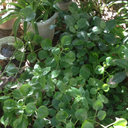Transfer of glycosylphosphatidylinositol-anchored proteins to deficient cells after erythrocyte transfusion in paroxysmal nocturnal hemoglobinuria.
Keywords
Abstract
In paroxysmal nocturnal hemoglobinuria (PNH), an acquired mutation of the PIGA gene results in the absence of glycosylphosphatidylinositol (GPI)-anchored cell surface membrane proteins in affected hematopoietic cells. Absence of GPI-anchored proteins on erythrocytes is responsible for their increased sensitivity to complement-mediated lysis, resulting in hemolytic anemia. Cell-to-cell transfer of CD55 and CD59, 2 GPI-anchored proteins, by red cell microvesicles has been demonstrated in vitro, with retention of their function. Because red cell units stored for transfusion contain many erythrocyte microvesicles, transfused blood could potentially serve as a source of CD55 and CD59. We examined whether GPI-anchored proteins could be transferred in vivo to deficient cells following transfusions given to 6 patients with PNH. All patients were group A(1) blood type. Each was given transfusions of 3 U of compatible, washed group O blood. Patient group A(1) cells were distinguished from the transfused group O cells by flow cytometry and staining with a labeled lectin, Dolichos biflorus, which specifically binds to group A(1) erythrocytes. Increased surface CD59 was measured on recipient red cells and granulocytes 1, 3, and 7 days following transfusion in all 6 patients. Our data suggest a potential therapeutic role for GPI-anchored protein transfer for severe PNH.


